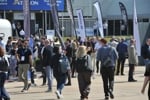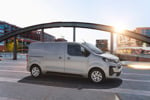When looking at the huge amounts of money involved in running a leasing operation and the risk it involves, the sums can be staggering.
And for Lloyds TSB autolease, Britain's biggest contract hire and leasing company, even its smaller costs could account for the entire turnover of some smaller rivals. With a fleet of 145,000 vehicles, it has assets worth a showroom value of up to £2 billion.
Taking the average mileage of company cars at 20,000 miles a year, customers' vehicles cover 2.9 billion miles annually. If vehicles average 35mpg across the fleet, they would consume 83 million gallons of fuel, costing £285 million. And residual values take on a whole new meaning, when an error of 1% in predicting the future prices of the fleet can cost tens of millions of pounds.
Considering the pressures involved, one might expect Lloyds TSB autolease managing director Nigel Stead to be a nervous wreck, especially as he has created this mammoth of the contract hire industry during a buying spree lasting a little over five years.
But there isn't even the sign of a tremble as he sits in the firm's Birmingham headquarters. In fact he seems calm, even jovial.
After all, he has successfully taken the firm he started with – Black Horse Vehicle Management – through a series of acquisitions that have seen its fleet size grow from 9,000 to 145,000.
Lloyds TSB autolease is, in fact, created from 12 other companies which have been bought outright, or whose assets have been acquired, including ACL Autolease/ Motorent and the vehicle fleet of First National Vehicle Holdings.
This could have created a maze of different management layers, customer service standards, contracts and finance systems that left the customers bewildered – and looking for a new supplier.
But Stead has successfully engineered an integration policy that helped customers benefit, staff remain loyal and service levels stay high and the company says it has plenty more plans in the pipeline.
Stead said: 'The aim has been to create one company and one culture and the customers are happy with the result of bringing all the companies together.
'We have brought all the different cultures into one. It is much more inclusive and we have concentrated heavily on communicating with staff and customers every step of the way. Customers could see that acquisition was a good thing. We had the benefit of a very strong bank and brand behind us. But the quality and commitment of the staff has been important. They have been motivated and it has been successful, but then we have had plenty of practice at integrating businesses.'
A business model was put in place with each acquisition, Stead said, and a critical path and milestones introduced, with aggressive timescales for employees to meet for ensuring acquired companies or staff were integrated into the business.
Stead added: 'It is right for the business and customers and staff that we get on with it. It puts certainty back in the business. Afterwards, you can then spend time tying up any loose ends, because however much time you allow yourself, it will never be enough.
'We have been in a process of integration for three years with acquisitions. It does put a lot of strain on people, but they have had tremendous support. With all these changes, there is a grave risk you can become inward-looking. You have to be, clearly, but the trick is doing so without the customers noticing, because their service is unaffected.'
An example of the quality of service still offered can be seen in the phone logs. The firm receives 12,000 customer enquiries by phone a month, and on average it takes just over four seconds to answer each one. Only 24 go through to voicemail.
The success of the integration policy was a key reason that Lloyds TSB autolease was named Toyota-sponsored Best Contract Hire/Fleet Management Company at the 2003 Fleet News Awards.
The judges said: 'In the past few years, the contract hire market has changed beyond recognition, with record levels of consolidation. At the forefront of this change has been Lloyds TSB autolease. Despite doubling in size, the customer has not suffered because of the changes. Along with good business processes and a growing product range, it shows size and service can go together.'
The acquisitions have also enabled the leasing firm to gain strength in new markets, in particular the public sector and structured personal leasing, through Whitechapel, which won the Jaguar-sponsored Best Alternative Car Scheme at this year's awards.
Stead admitted: 'We have had a fairly active three to four years. People keep asking when are we doing the next acquisition. We never started out to be number one. We just had an acquisition programme designed to make us a major player in the market. We would have been happy as number two in the market.
'The scale will bring benefits to the business and to the customers and it has addressed the product stream weaknesses that we had, such as car ownership schemes and the public sector.'
The business is now focusing on ensuring it gains the maximum benefit from the years of change it has undergone.
Stead added: 'We have expanded significantly and although we cannot say we wouldn't make another acquisition. The offer would have to be able to give the business something additional to what it already has and can already offer customers.'
The business is currently working with fleets of all sizes and is also ensuring it makes the most of the immense Lloyds TSB client base, covering hundreds of thousands of business clients.
Stead added: 'Employees also offer a vital link, for either new and used car funding schemes, or for the vehicles themselves. Selling to staff alone opens a market of as many as 80,000 people.
'We want to grow, but now the focus is on using our assets to expand organically. Contract hire is still a growth market, along with personal schemes, but additional services are also important. We believe service companies should be in a position to relieve clients of key burdens, for example driver training, helping deal with London congestion charging, the EU Fourth Insurance Directive and health and safety issues.
'Post integration, there is more resource available for us to offer customers and we are also determined that our focus on customer service will grow.'















Login to comment
Comments
No comments have been made yet.